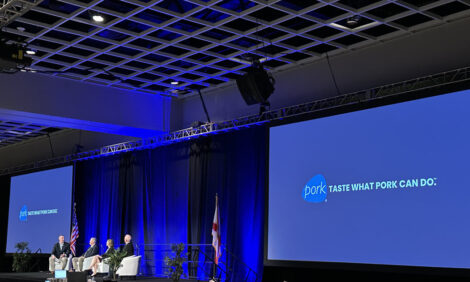



Selko shares research at International Pig Veterinary Society/ESPHM joint conference
Studies consider how organic acid blends in feed and water and trace mineral source support pigletsSelko, the feed additives brand of Nutreco, is sharing research findings on dietary strategies to support pig health, performance, and efficient production during the joint congress of the 27th International Pig Veterinary Society (IPVS) and 15th European Symposium of Porcine Health Management (ESPHM) in Leipzig, Germany, 4-7 June.
Selko research findings show that science-based nutrition can help producers navigate pig production challenges including restrictions on the use of high levels of zinc oxide (ZnO) and antibiotic growth promoters and common enteric health issues like post-weaning piglet diarrhoea. Highlights from three Selko research posters displayed at IPVS/ESPHM are summarized below:
Effect of organic acid blends in feed and water and copper source on feed efficiency and diarrhoea incidence
In June 2022, the European Union banned the practice of feeding high levels of ZnO in livestock production and more regions are expected to implement similar bans. A study involving 150 weaned piglets and comparing five dietary treatments looked at the performance effects of a blend comprised of an organic acid, medium chain fatty acid and a phenolic compound (MCOAP) and/or Selko pH in water and IntelliBond Cu in different combinations as a replacement for ZnO. Researchers studied the effects of the blended feed additive, water-based organic acid use and hydroxychloride copper additive on weaned piglets’ growth performance and health status.
Study findings revealed that combining a multi-component feed additive with water-based organic acids tended to improve the feed conversion ratio (FCR) compared to ZnO, while the combination of all additives reduced the diarrhoea incidence compared to pigs in the negative control group.
Effect of hydroxychloride (Zn) zinc mineral source on immune system of weaned piglets under LPS challenge
As an essential trace mineral, zinc (Zn) plays an important role in supporting pigs’ immunity. A study involving 144 piglets under an LPS challenge assessed the effects of supplementing pigs with a hydroxychloride zinc source (IntelliBond Z) along with hydroxychloride copper and manganese (IntelliBond C and IntelliBond M). Indicators of immune response in animals fed hydroxychloride trace minerals were compared to piglets receiving inorganic sources of added zinc, copper, and manganese; and a control group receiving no added zinc and inorganic copper from CuSO4 and manganese from MnO. Piglets were challenged with an LPS challenge and researchers tracked feed intake, faecal scores, and growth performance. ELISA was used to measure immune parameters in blood samples.
The study findings showed that immune parameters, especially TNF-α and possibly IL-10, were affected by hydroxychloride minerals. These findings indicate that piglets fed the hydroxychloride minerals displayed a modestly enhanced resilience to an LPS challenge.
Effect of a combination of additive blends in feed and water with hydroxychloride copper as AGP alternative to support intestinal health
Regulatory actions as well as retailers’ and consumers’ demands are influencing pig producers to reduce the use of antibiotics in their production efforts. A study involving 120 weaned piglets evaluated four dietary treatments including a negative control diet with no additives; the control diet with AGPs and zinc as a top dressing; the control diet with a blended feed additive (Presan-FX), hydroxychloride copper (IntelliBond C), and an organic acid blend in the water (Selko-pH); and the control diet including the blended feed additive (Presan-FX), an organic acid additive in the feed (Fysal MP along with hydroxychloride copper (IntelliBond C). Researchers tracked growth performance, evaluated gut morphology, and measured microbiota.
Findings showed that piglets receiving diets with the blended feed additive, supplemental organic acids in feed or water and hydroxychloride copper saw positive effects on villus height (P<0.05), crypt depth ratio and colonic small chain fatty acids compared to animals in the negative and positive control groups. Overall piglets fed combinations of organic acids, multi-component feed additive and copper had improved growth performance, gut morphology, enzyme activity, intestinal SCFA and a modified intestinal microbiota, compared to piglets fed the negative control diet or the diet supplemented with AGPS and zinc.
Selko invests in research across each phase of production to understand the interrelationships between nutrition, animal physiology, production practices and marketplace demands. Selko researchers also continue to study the synergies that occur as different combinations of ingredients act inside the animal to support animal health, contribute to growth, and enhance production efficiencies.






